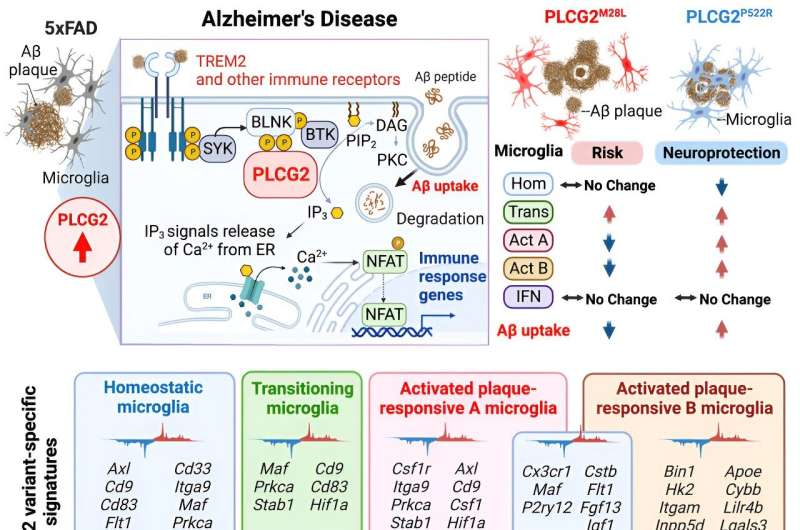This article has been reviewed according to Science X's editorial process and policies. Editors have highlighted the following attributes while ensuring the content's credibility:
fact-checked
peer-reviewed publication
trusted source
proofread
Researchers identify new gene mutation that alters Alzheimer's disease risk

A study led by experts from Indiana University School of Medicine has shed new light on the genetic underpinnings of Alzheimer's disease. The team's research, rooted in human genetics studies, has unearthed a critical mutation within a key gene operating in the brain's immune cells, potentially elevating the risk of Alzheimer's disease.
The research team included several IU investigators within Stark Neurosciences Research Institute—Gary Landreth, Ph.D., the Martin Professor of Alzheimer's Research; Bruce Lamb, Ph.D., executive director of Stark Neuroscience Research Institute; Stephanie Bissel, Ph.D., assistant professor of genetics; Kwangsik Nho, Ph.D., associate professor of radiology and imaging sciences; and Adrian Oblak, Ph.D., assistant professor of radiology and imaging sciences.
Their research was recently published in the journal Immunity.
Andy Tsai, Ph.D., a graduate of the Medical Neurosciences Graduate Program, was the driving force behind the research, encompassing his Ph.D. thesis. Tsai, now a postdoctoral fellow at Stanford University Medical School, has significantly contributed to unraveling the mysteries of Alzheimer's disease.
The focal point of the investigation revolved around the phospholipase C gamma 2 (PLCG2) gene, intricately entwined within microglia—central to the brain's immune response. This genetic anomaly, discovered through analysis of the gene's biological workings, showcased the impact of specific rare variants. The study found that the M28L variant heightened the susceptibility to Alzheimer's disease, whereas the P522R variant exhibited a risk-reducing effect.
Innovative mouse models of Alzheimer's disease developed by the MODEL-AD Center allowed researchers to substantiate their findings. Immune cells harboring risk-reducing gene variants demonstrated a reduction in amyloid plaques, while those carrying the risk-elevating variants exhibited a surge in plaque accumulation. The study unveiled specific gene clusters orchestrating these alterations in immune cell behavior within microglia.
Microglia, often regarded as the brain's first line of defense against infections, toxins and damage, has garnered attention for its significant role in influencing disease susceptibility.
"The microglial response affects neurons which then affects the capacity to learn and form new memories," Landreth said.
Extensive collaboration within Stark Neurosciences Research Institute enabled a comprehensive evaluation of the gene's implications. This included a comparison between preclinical data from animal models and real-world human data on Alzheimer's disease.
"This represents a collaboration that could've only been achieved at Stark," Landreth said. "We used human genetics to investigate and identify a mechanism, and indeed we have."
The study's paramount importance lies in explaining the critical role of microglial immune responses and their potential to impact disease risk, positively or negatively. This discovery promises to reshape the understanding of Alzheimer's disease and carve a path toward targeted therapeutics, which is being pursued by the TREAT-AD Center.
More information: Andy P. Tsai et al, Genetic variants of phospholipase C-γ2 alter the phenotype and function of microglia and confer differential risk for Alzheimer's disease, Immunity (2023). DOI: 10.1016/j.immuni.2023.08.008





















